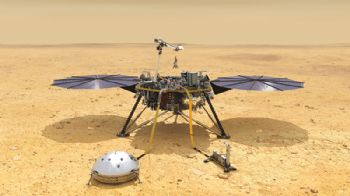
The NASA InSight lander, which is supported by the UK Space Agency, has recorded 400 likely ‘Marsquakes’ in the first year of its mission.
The seismic vibrations on Mars were detected by a set of silicon sensors developed in the UK for InSight’s ‘Seismic Experiment for Interior Structure’ (SEIS).
Imperial College London, Oxford University, the University of Bristol and STFC RAL Space worked together — with £4 million in funding from the UK Space Agency — to develop three sensors that are sensitive enough to detect motion at ‘sub-atomic scales’.
The NASA Insight mission, which is the first one to look deep beneath the Martian surface, detected the first ever recorded Marsquake on 6 April 2019.
By the end of last year, it was detecting an average of two quakes every day, which suggests that Mars experiences quakes more often, albeit more mildly than expected (the largest measured 4.0 on the Richter scale).
Tom Pike at Imperial College London (
www.imperial.ac.uk), who leads the UK team, said: “From the tremors, we can build up a cross-section of Mars all the way down to the core.
"The remains of a liquid core could suggest that Mars once had a magnetic field, which would have protected it from harmful solar winds billions of years ago.
"Back then, Mars was much warmer and wetter, and much more hospitable for life.
"Studying Mars lets us travel to the solar system’s ancient past.
"While the tectonic systems of Earth and Venus have destroyed most of the evidence of their early history, much of the ‘Red Planet’ has remained static for more than three billion years.”